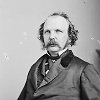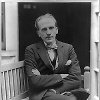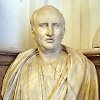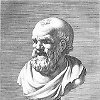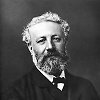If it's on the Internet it must be true

There are countless quotation websites that do not bother to include sources on their pages. How often have you come across a ridiculous or unlikely quote being attributed to Albert Einstein, Confucius or Abraham Lincoln? Many people seem to believe that if it's on the Internet, it must be true.
However, it should be obvious that quoting without providing a source is not a good practice, but we cannot place all the blame on the Internet. In fact, there are quote dictionaries from more than 100 years ago (like this one) that list quotes without any sources at all. There is one difference though: the proportion of spurious quotes in early dictionaries is not nearly as large as it is on the Internet.
We have chosen several examples from quote websites that highlight just how widespread the issue of apocryphal quotes is. As Abraham Lincoln said the saying goes, "Don't believe everything you read on the Internet."
1. Don't cry because it's over, smile because it happened
Widely attributed to Dr. Seuss, it can't be found in any of his works. The Quote Investigator gives the credit to Ludwig Jacobowski.
2. The definition of insanity is doing the same thing over and over and expecting a different result
Often attributed to Albert Einstein, it first appeared in Rita Mae Brown's book, "Sudden Death," published in January 1983.
3. Be who you are and say what you feel, because those who mind don't matter, and those who matter don't mind.
Commonly attributed to Dr. Seuss or Bernard M. Baruch. It was never found in any original work of either.
4. Before you embark on a journey of revenge, dig two graves
One of the many spurious quotes attributed to Confucius.
5. 640 K ought to be enough for anybody.
Bill Gates himself denied the attribution: "I've said some stupid things and some wrong things, but not that".
6. Laws, like sausages, cease to inspire respect in proportion as we know how they are made.
Otto von Bismarck never said that. The earliest known reference to this quote is credited to John Godfrey Saxe.
7. Evil is the result of what happens when man does not have God's love present in his heart.
Another apocryphal quote attributed to Albert Einstein.
8. Success consists of going from failure to failure without loss of enthusiasm.
There are many fake quotes attributed to Winston Churchill. This is one of them. Langworth's Churchill by Himself debunks the attribution.
9. It's better to burn out than to fade away.
Although Kurt Cobain used these words in his suicide letter, he was just quoting part of the song Hey Hey, My My (Into The Black) by Neil Young. Nonetheless Cobain is often credited as the originator of the phrase.
10. Nearly all men can stand adversity, but if you want to test a man's character, give him power.
Commonly attributed to Abraham Lincoln, it was probably derived from an idea expressed by Thomas Carlyle.
11. Life is not fair. Get used to it... Be nice to nerds. Chances are you'll end up working for one.
One more spurious quote attributed to Bill Gates.
12. I have a really high IQ, Phil. I mean, c'mon. It's impossible for me to not be atheist.
Donald Trump never said these words.
13. Politicians are like diapers: they should be changed often, and for the same reason.
Even if these words are ascribed to Mark Twain, the earliest reference to the quote was found in a record from 1993 without attribution.
14. If you have an apple and I have an apple and we exchange these apples then you and I will still each have one apple. But if you have an idea and I have an idea and we exchange these ideas, then each of us will have two ideas.
Attributed to George Bernard Shaw but actually said by Charles F. Brannan
15. If you live to be a hundred, I want to live to be a hundred minus one day so I never have to live without you.
Most likely based on a dialog between Christopher and Pooh from his book The House at Pooh Corner
16. I disapprove of what you say, but I will defend to the death your right to say it.
Often attributed to Voltaire, but first used by Evelyn Beatrice Hall to describe Voltaire's views.
17. The end justifies the means.
Machiavelli never used these exact words in his book The Prince.
Related Topics
Featured on this list
